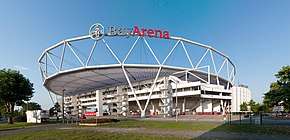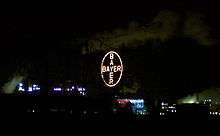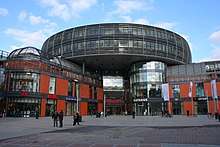Leverkusen
Understand
Leverkusen is a relatively young city; its history is strongly linked to the growth of the Bayer chemical and pharmaceutical plants. Until the mid-19th century, there were some smaller settlements, including today's boroughs Opladen or Schlebusch, but no city of Leverkusen as such.
In 1861, the chemist Carl Leverkus (1804–1889) founded his synthetic ultramarine factory near the village of Wiesdorf. His workers' settlement was named Leverkusen after its founder. In 1891, the paint and pharmaceutical company Bayer AG, which was founded in Wuppertal-Barmen, moved their production to Leverkusen. In the 20th-century, there was a constant influx of workers and their families to Leverkusen and the surrounding settlements to work at the ever-growing Bayer plants.
In 1920, Wiesdorf was granted a city charter. Only in 1930, Schlebusch and other neighbouring settlements were incorporated into the city which now took the name of Leverkusen. The neighbouring towns Opladen and Bergisch Neukirchen were incorporated in 1975, pushing the number of inhabitants over 167,000. The city's dominant and connecting element have always been Bayer's huge chemical and pharmaceutical plants; the Bayer AG is to date the city's prime employer and corporate tax payer.

Internationally, Leverkusen is mainly known for its successful football (soccer) club, Bayer 04 Leverkusen, which was founded as a team of Bayer factory workers and is a fully-owned subsidiary of the chemical company. It has finished second-place in several national and international competitions, but never won the German championship, therefore being jokingly dubbed Vize-Kusen ("runner-up-Kusen") by fans of other clubs.
Get in
The closest international airports are Cologne-Bonn (CGN IATA; 22 km south of Leverkusen, 32 minutes by train) and Düsseldorf (DUS IATA; 40 km north of Leverkusen; 35 minutes by train).
The closest stations with high-speed and intercity service are in Cologne, Düsseldorf and Solingen. From there, frequently running regional trains and urban rail (S-Bahn) take you to Leverkusen (15 minutes from either Cologne or Düsseldorf, half an hour from Solingen).
Get around
See


- 🌍 Morsbroich Museum (Städtisches Museum Schloss Morsbroich). Tu W F–Su 11:00-17:00, Th 11:00-21:00 (if it is a public holiday 11:00-17:00); closed on Mondays. Former water castle, later transformed into a Rococo chateau, now a municipal museum of modern and contemporary art; surrounded by a sculpture park. Adults €5.50; children, students €4.
- 🌍 Bayer-Kreuz, Friedrich-Ebert-Straße/Willy-Brandt-Ring (Bus "CHEMPARK Tor 1"). 51-metre-high logo of the Bayer chemical and pharmaceutical company; illuminated at night.
- 🌍 Japanese Garden (Japanischer Garten), Otto-Bayer-Straße (next to the Bayer-Kommunikationszentrum; Bus 201, 220, 233 or 255 "Bayerwerk Tor 2"). Apr–Oct: M–F 09:00-20:00, Sa Su & public holidays 09:30-20:00; November–March M–F 09:00-16:30, Sa Su & holidays 09:30-17:00. Beautiful, 3.7-acre Japanese-style garden, incepted in the 1920s by a Bayer chairman who returned from a trip to Japan, impressed by its garden culture. Free.
Do
- Watch football ie soccer at Bayer 04 Leverkusen, who play in Bundesliga, the top tier of German football. Their home ground is BayArena, capacity 30,000; it's 500 m northeast of Leverkusen Mitte railway station.
Buy

Eat
Drink
Sleep
- Ibis Budget Köln Leverkusen City, Manforter Straße 29, ☎ +49 214 401062.
- Ibis Köln Leverkusen, Lichstraße 72, ☎ +49 214 83029-0.
- Altstadt Hotel, Lichstraße 43, ☎ +49 214 83008-0.
- Lindner Hotel BayArena, ☎ +49 214 8663-0.
- Hotel Leverkusen (Best Western), Am Buchelter Hof 11, ☎ +49 214 3830.
Connect
Go next
- Cologne, 13 km south (15 minutes by train)
- Düsseldorf, 32 km north (15 minutes by train)
- Bergisch Gladbach, 13 km east (25 minutes by train)
- Solingen, 20 km northeast (half an hour by train)